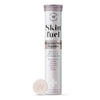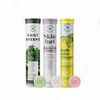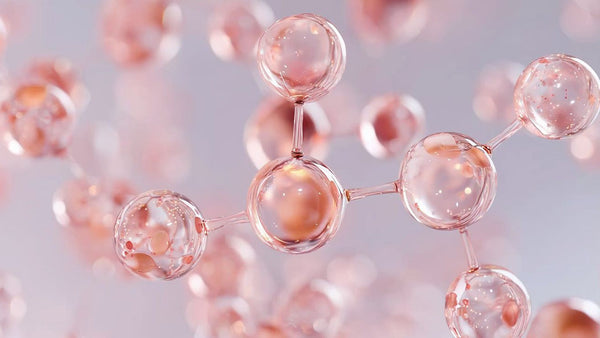If you are someone who follows the skincare industry closely, we bet that you must've heard about hyaluronic acid. Even if you haven't, but are curious, you've come to the right place as this blog talks about what hyaluronic acid is and the advantages of hyaluronic acid you can enjoy by including it in your daily routine. So, what are you waiting for? Read along.
What is Hyaluronic Acid?
Also known as hyaluronan, hyaluronic acid is a gooey, clear substance that is produced naturally by your body. It’s most commonly found in your connective tissues, eyes, and skin. The primary function of hyaluronic acid is to help your body retain moisture in several tissues. However, hyaluronic acid production tends to decrease with age and causes dry eyes, dry skin, painful joints, etc. It is for this reason that getting hyaluronic acid from external sources is crucial.
Hyaluronic Acid for Your Skin Type
Hyaluronic acid benefits skin in several ways. It is a well-known skincare component. It is a naturally occurring chemical in the body that aids in the retention of moisture and the hydration of the skin. Here's how hyaluronic acid can benefit various skin types:
1. Dry Skin:
Hyaluronic acid is a good choice for dry skin since it provides significant hydration. It aids in moisture retention, limiting water loss, and keeping the skin plump and supple.
2. Oily Skin:
It is a mild substance that does not feel heavy on the skin, and it limits sebum excretion in oily skin. It can also help reduce excess oil production by keeping the skin moisturized.
3. Combination Skin:
Hyaluronic acid is a versatile substance that can be beneficial for mixed skin. It can help moisturize dry skin while also reducing oil production in oily regions.
4. Sensitive Skin:
Hyaluronic acid is a mild substance that can be utilized by sensitive skin types. It soothes and calms the skin while reducing redness and inflammation.
Top 6 Advantages of Hyaluronic Acid: Why You Should Include It in Your Diet
Here are the top 6 hyaluronic acid benefits you can enjoy:
1. Supple and Healthy Skin
Almost half of the hyaluronic acid in your body is found in your skin, which helps retain moisture. However, because of UV radiation and natural aging, the production of hyaluronic acid declines, which can lead to dry skin. Fortunately, you can deal with this by including hyaluronic acid in your diet. According to research, consuming 120–240 mg of hyaluronic acid each day for at least a month can enhance moisture in your skin and reduce dryness. What’s more, hyaluronic acid can also prevent the appearance of fine lines, and wrinkles and ensure supple and healthy skin.
2. Relief from Joint Pain
When lubrication in the space between your joints and bones reduces, it can lead to uncomfortable pain due to friction. However, as HA is also found in your joints, its role is to keep them well lubricated for comfortable movement. So, if you’re suffering from joint pain, make sure to include HA to deal with it.
3. Better Wound Healing Process
Hyaluronic acid plays an important role when it comes to wound healing. Research says that HA is involved in two important steps of wound healing, which are angiogenesis and inflammation. Also, it helps with tissue regeneration, which is another important part of healing. What’s more, topical application of HA can help prevent mouth ulcers after tooth surgery and aid in a speedy recovery.
4.Reduce Pigmentation
It inhibits melanin formation, which brightens the skin and reduces pigmentation. When Vitamin C and Hyaluronic Acid are combined, the moisture provided by Hyaluronic Acid allows it to work more efficiently, which means it is more effective in minimizing the effects of skin pigmentation.
5. Relief from Acid Reflux Symptoms
Acid reflux is an unpleasant process wherein the contents of your stomach regurgitate up your throat, including stomach acid. This is quite painful and might also damage your esophagus. However, some human studies have shown that supplementing with HA can help relieve acid reflux symptoms. For instance, one study revealed that taking HA along with an acid-reducing medication and chondroitin sulfate could help control gastroesophageal reflux.
6. Relief from Dry Eyes and Discomfort
Dry eyes are a pretty common issue. About 1 out of every 7 older adults suffer from dry eyes, either due to quick tear evaporation or reduced tear production. However, because of HA’s ability to retain moisture, hyaluronic acid can help you deal with dry eyes. Most eye drops containing 0.1-0.4% HA have proven to be effective for dry eye symptoms. Having said that, eye drops are meant for temporary relief and not for long-term use.
For long-term benefits for any of the aforementioned points, you can try ingesting HA via supplements.
Skin Fuel from Wellbeing Nutrition is a drinkable skincare product that not only comes with potent hyaluronic acid but also offers l-glutathione, Japanese marine collagen, and several vitamins. This supplement is capable of offering you amazing benefits, such as:
- Glowing skin
- Hydrated skin
- Reduced wrinkles and fine lines
- Reduced acne or inflammation
- Better collagen levels
- Better skin elasticity and overall health
Wrapping Up
Hyaluronic acid, although made famous by the beauty industry, has a number of other benefits. This ingredient is highly effective at retaining moisture and ensuring elasticity. Topical application of hyaluronic acid will only affect the upper few layers of your skin, so having it orally via supplements can give you faster, better, & longer-lasting results.
FAQs
-
Are there any side effects of using Hyaluronic Acid daily?
When taken as an oral supplement, Hyaluronic Acid is generally safe with minimal side effects. Some individuals may experience mild digestive issues like bloating or nausea, but these are rare. -
Is Hyaluronic Acid suitable for all skin types?
Yes, as an oral supplement, Hyaluronic Acid supports skin hydration and is suitable for all skin types. It helps improve skin moisture levels, reduce dryness, and promote a healthy, youthful appearance. -
Can I use Hyaluronic Acid with other supplements or medications?
Hyaluronic Acid can generally be combined with other supplements, like collagen or vitamins, without issues. However, it’s always best to consult a healthcare provider before adding new supplements to your routine, especially if you're on medication. -
Is Hyaluronic Acid suitable for all ages?
Hyaluronic Acid supplements can be beneficial for individuals of all ages, supporting skin hydration and joint health. It is particularly beneficial for those over 30 as natural levels of hyaluronic acid begin to decline with age.
References
Papakonstantinou, E., Roth, M., & Karakiulakis, G. (2012). Hyaluronic acid: A key molecule in skin aging. Dermato-endocrinology, 4(3), 253–258. https://doi.org/10.4161/derm.21923
Kawada, C., Yoshida, T., Yoshida, H., Matsuoka, R., Sakamoto, W., Odanaka, W., Sato, T., Yamasaki, T., Kanemitsu, T., Masuda, Y., & Urushibata, O. (2014). Ingested hyaluronan moisturizes dry skin. Nutrition journal, 13, 70. https://doi.org/10.1186/1475-2891-13-70
Litwiniuk, M., Krejner, A., Speyrer, M. S., Gauto, A. R., & Grzela, T. (2016). Hyaluronic Acid in Inflammation and Tissue Regeneration. Wounds : a compendium of clinical research and practice, 28(3), 78–88. https://pubmed.ncbi.nlm.nih.gov/26978861/
Casale, M., Moffa, A., Vella, P., Sabatino, L., Capuano, F., Salvinelli, B., Lopez, M. A., Carinci, F., & Salvinelli, F. (2016). Hyaluronic acid: Perspectives in dentistry. A systematic review. International journal of immunopathology and pharmacology, 29(4), 572–582. https://doi.org/10.1177/0394632016652906
Kogan, G., Soltés, L., Stern, R., & Gemeiner, P. (2007). Hyaluronic acid: a natural biopolymer with a broad range of biomedical and industrial applications. Biotechnology letters, 29(1), 17–25. https://doi.org/10.1007/s10529-006-9219-z
Savarino, V., Pace, F., Scarpignato, C., & Esoxx Study Group (2017). Randomised clinical trial: mucosal protection combined with acid suppression in the treatment of non-erosive reflux disease - efficacy of Esoxx, a hyaluronic acid-chondroitin sulphate based bioadhesive formulation. Alimentary pharmacology & therapeutics, 45(5), 631–642. https://doi.org/10.1111/apt.13914
Javadi, M. A., & Feizi, S. (2011). Dry eye syndrome. Journal of ophthalmic & vision research, 6(3), 192–198. https://www.ncbi.nlm.nih.gov/pmc/articles/PMC3306104/
Yang, Y. J., Lee, W. Y., Kim, Y. J., & Hong, Y. P. (2021). A Meta-Analysis of the Efficacy of Hyaluronic Acid Eye Drops for the Treatment of Dry Eye Syndrome. International journal of environmental research and public health, 18(5), 2383. https://doi.org/10.3390/ijerph18052383





























 DOWNLOAD NOW
DOWNLOAD NOW
